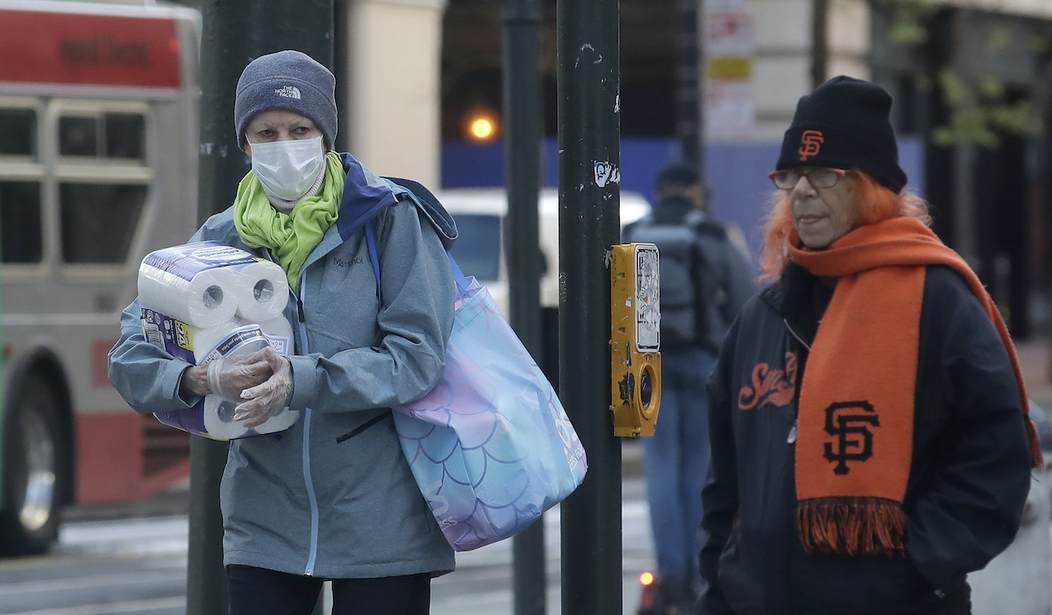Precedent doesn't provide much guidance. There's a deadly coronavirus threatening to circulate through the population. The resulting government orders and social sanctions of self-distancing and self-isolating behavior are unprecedented in living memory.
Operating without guiding precedents casts into doubt many longstanding practices and assumptions.
First, as the Hoover Institution's Michael Auslin writes in RealClearPolitics, "After dealing with the first great global crisis of the 21st century, the world must fundamentally rethink its dependence on China."
Americans are suddenly realizing they depend on China for health care products from face masks to pharmaceutical medicines, including nearly half our penicillin and nearly all our ibuprofen.
Veteran China watchers have noticed that China's economic growth has slowed down; its working-age population is peaking (thanks, one-child policy!); and its legal system and statistics remain unreliable. Now almost everyone is noticing, in Auslin's words, "China's lax public health care, incompetent and intrusive government, and generally less developed domestic conditions."
A turning point for China means a turning point for globalism. For 40 years, American leaders of both parties have assumed that cheap Chinese-produced consumer and manufactured goods are a bargain. COVID-19 strengthens the arguments of Trump Republicans and protectionist Democrats that these products actually cost too much.
Global supply chains, which seemed primed to reduce costs forever, now seem to have the potential to increase costs exponentially. Governments and business firms seem likely to conclude that it makes more sense to buy things made closer to home.
Recommended
Consumers may feel that way, too. Destination weddings, often requiring thousands of dollars to attend, may become sharply less common. Los Angeles suburbanites may skip a father-son ski trip to the Italian Dolomites and just drive four-plus hours to Mammoth Mountain instead.
Are we seeing a turning point in public policy as well? Blogger Mickey Kaus notes that President Donald Trump, in his (at last) impressive presentations, has called on big business leaders to help lead recovery efforts. For all the rhetoric obeisance to small businesses, this is reminiscent of how big business mobilized the nation in World War II.
That happened because former President Franklin Roosevelt knew from firsthand experience in World War I that then-President Woodrow Wilson's seizure of railroads and shipyards didn't work very well. To maximize production to destroy Hitler, Roosevelt calculated, government needed to enlist the guys who knew how to get things done.
The danger here is crony capitalism, a mostly unavoidable feature of our defense procurement systems ever since. And big business units, coddled by government, aren't usually good at innovation or efficiency. But we seem to be relying on them more anyhow.
And are we headed for more (any?) bipartisan cooperation on policy? Maybe. Donald Trump's admitting his harshness on the press and New York Gov. Andrew Cuomo's heartfelt praise of the Trump administration's efforts both point in that direction.
We may also see a turning point in a willingness to ditch, for the moment or permanently, bureaucratic and environmental rules and procedures that delay or impede actions, such as the January Centers for Disease Control and Prevention and Food and Drug Administration rulings that effectively blocked coronavirus testing.
COVID-19 hasn't -- yet -- been a turning point in the election process. The one turning point in the presidential race came Feb. 26, when South Carolina Rep. James Clyburn endorsed Joe Biden. The previously lagging Biden essentially clinched the Democratic nomination on Super Tuesday six days later.
Bernie Sanders, vote leader in Iowa, New Hampshire and California, trudges on but, barring a Biden collapse, to no apparent purpose. This raises a further question: Is there any reason to hold the two national conventions at all?
Sure, there's something to say for historic continuity -- Democrats have been meeting every four years since 1832, and Republicans have been since 1856. Personally, I'd like to stretch my record of having attended, in one shape or form, 24 of the 88 national conventions ever held.
But national conventions have long since lost their role as the unique communications medium through which politicians can palaver frankly. That communication has filled the air around us 24/7 for months. Legal requirements could be fulfilled by a virtual convention conducted electronically. We'd avoid exposing 77- and 73-year-old nominees to thousands of potential infectors.
Any turning point in our stubbornly persistent partisan patterns? I don't see one yet in the smattering of polls taken this month. Trump still trails Biden, and feelings about the direction of the nation are slightly less downbeat than those during most of the Obama years. But we're sailing in unprecedented waters.
Michael Barone is a senior political analyst for the Washington Examiner, resident fellow at the American Enterprise Institute and longtime co-author of The Almanac of American Politics.

























Join the conversation as a VIP Member